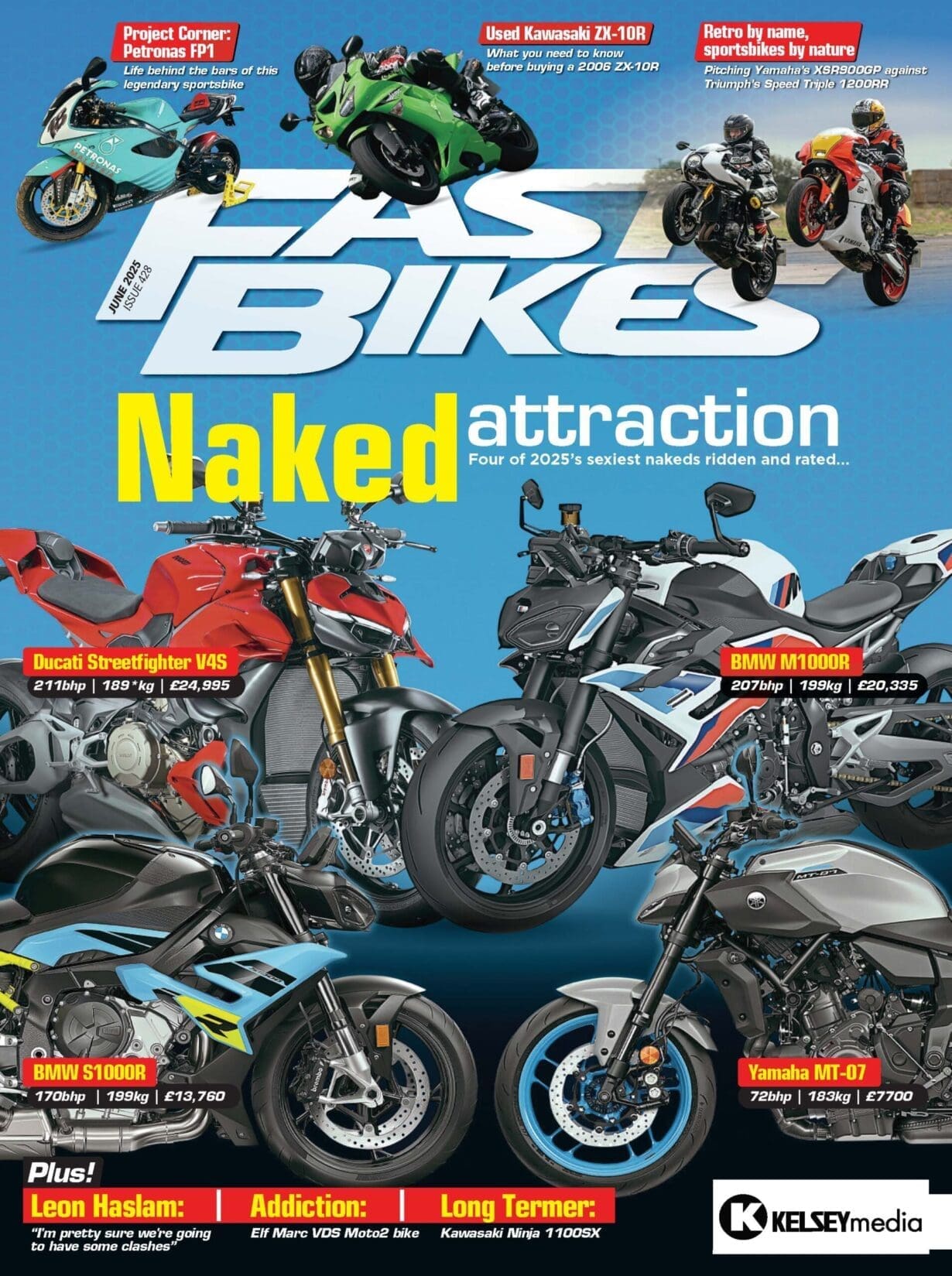When it came to breaking his adventure bike virginity, Yamaha’s new Tenere 700 Extreme proved perfect for Timmy.
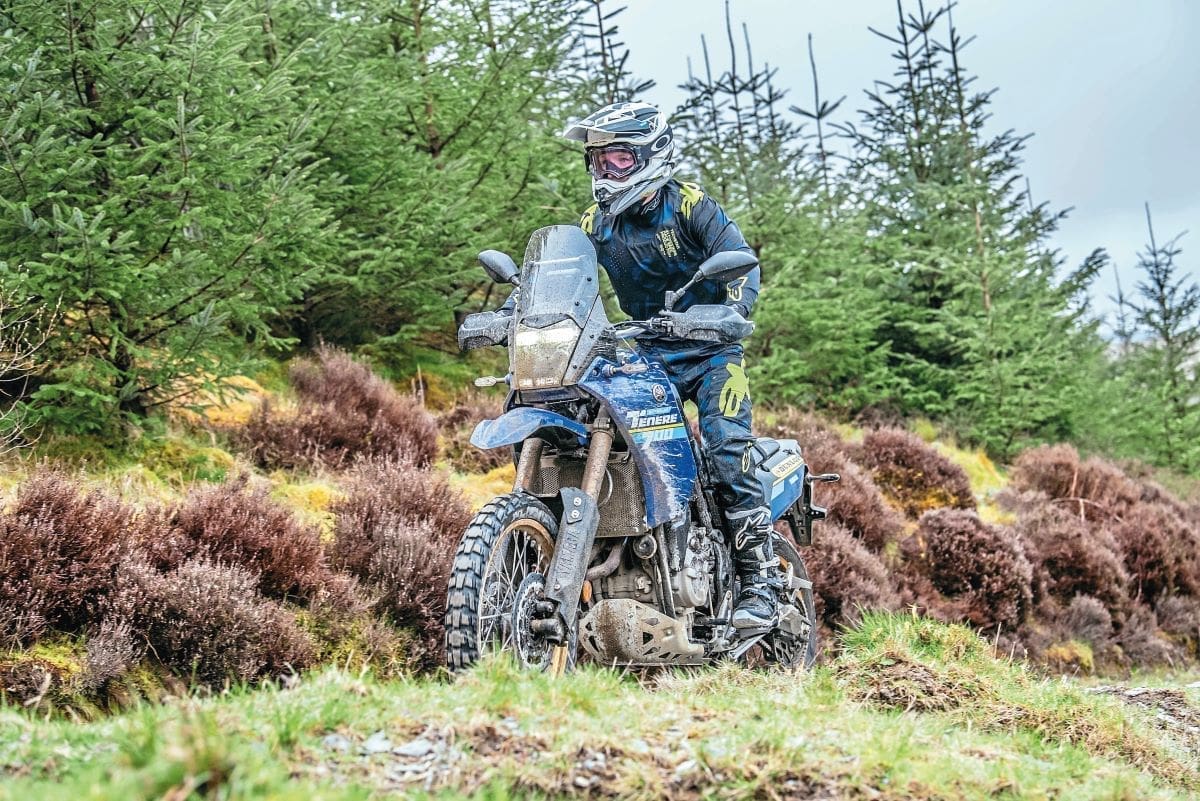
Words: Tim Neave Pics: Yamaha
As the old adage goes, if it ain’t broke, don’t fix it – and in an era of blinged-up, tech-overloaded machines, it’s all too easy to join the herd and follow the pack. Less is more sometimes, and it’s quite refreshing to jump on a bike and not have to think about which rider mode to go in, whether to use traction control, or if you’ve got the back mud pedal valve turbo ejector turned on. Yamaha’s Tenere 700 is the antithesis of this: a really simple, rider-friendly adventure machine that’s more than comfortable in its natural, simplistic and under-complicated shell.
Since Yamaha’s introduction of the Tenere 700 back in 2019, it’s been a sweet story of success. With more than 60,000 sales in Europe (4000-plus of those in the UK), the stats speak for themselves, and the T7 is one of Yamaha’s most important bikes – if not the most important bike in its wide line-up. The T7 now accounts for 30% of the middleweight adventure segment in Europe, an impressive accolade when you look at which bikes it goes head-to-head with, and while we’re on that note, unsurprisingly, the adventure sector is now Yamaha’s biggest in terms of bike sales.
Spreadsheets aside, you only have to read the reviews from Tenere owners to see just how satisfied they are with their machines and how proud they are to be part of the community and Tenere journey. There’s clearly a lot of hype surrounding this bike, so for a Tenere virgin like me, there was only one thing to do… go and see for myself.
For those of us who are not fully up to speed with the tenacious Tenere 700 and the different variations available, allow me. There are four models: the standard Tenere for the budget-friendly all-rounder; the Explore, which is the most road-going machine; the World Raid for long-distance adventure riding; and the all-new Tenere Extreme, which fills the void of the outgoing Rally edition and is the most off-road orientated adventure machine that Yamaha produces. Of course, I was in the Welsh valleys to put the new Extreme through its paces, but just before we get into what I made of it, here’s a little more detail on what makes the Extreme so… extreme.
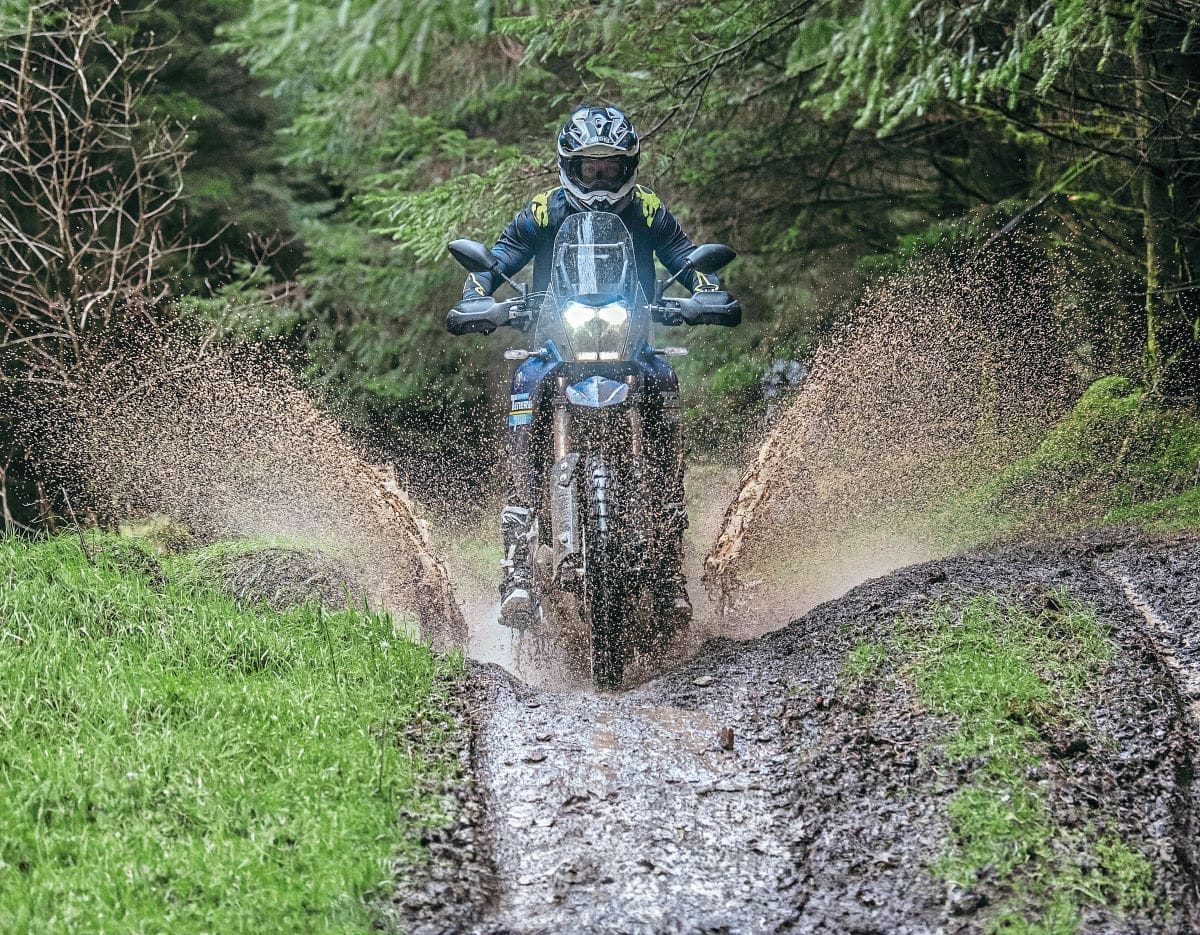
First up and probably most notable is the highly upgraded suspension. We’ve got premium 43mm KYB forks with an extra 20mm of travel over the standard and a super-slippery Kashima coating on the internals, and a premium long-stroke rear shock with an extra 20mm of travel to match. With additional travel in mind, Yamaha has designed a new shock linkage to keep it working in the correct progressive manner, and both the shock and forks have fully adjustable spring preload, and also rebound and compression damping. For you and me, this means better bump absorption, feedback, and a more comfortable ride, meaning we can go for longer (on the bike!). With a new ground clearance of 260mm, these Teneres are ready for an off-road challenge – and where better to put them through it than at Yamaha’s off-road experience centre in Llanidloes?
A flat one-piece seat is factory-fitted, which makes sliding your bodyweight forward and back a simple task; a necessity in off-road riding, so a vital component on the Extreme. It’s also 20mm thicker in padding, giving a comfier ride and more leg room, but on the flip side adds even more height to an already tall motorcycle – not so good for us short arses when it comes to setting off and stopping, as I found out at every given opportunity!
Finally, this model has much bigger, grippier foot pegs, which I know might seem barely worth mentioning but is one of the most essential parts when it comes to bike control; it is, after all, one of only three points of contact we have when we’re riding bikes. These pegs are made out of titanium and are 200g lighter than standard, and rubber inserts are available as an optional extra for reduced vibration while road riding.
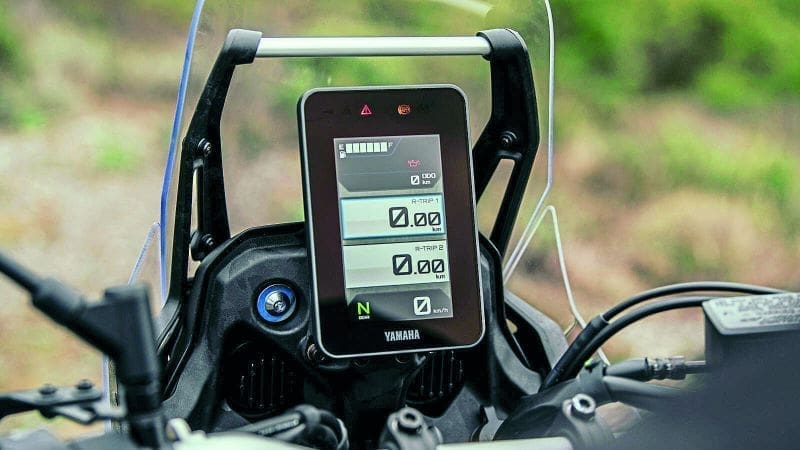
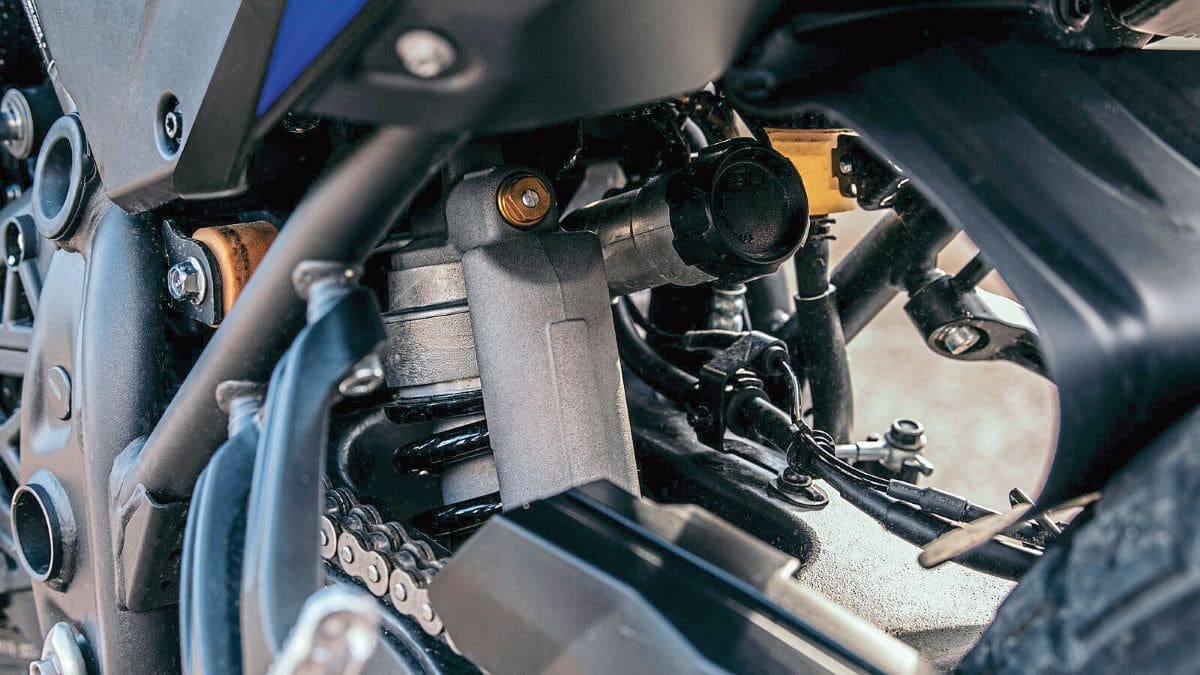
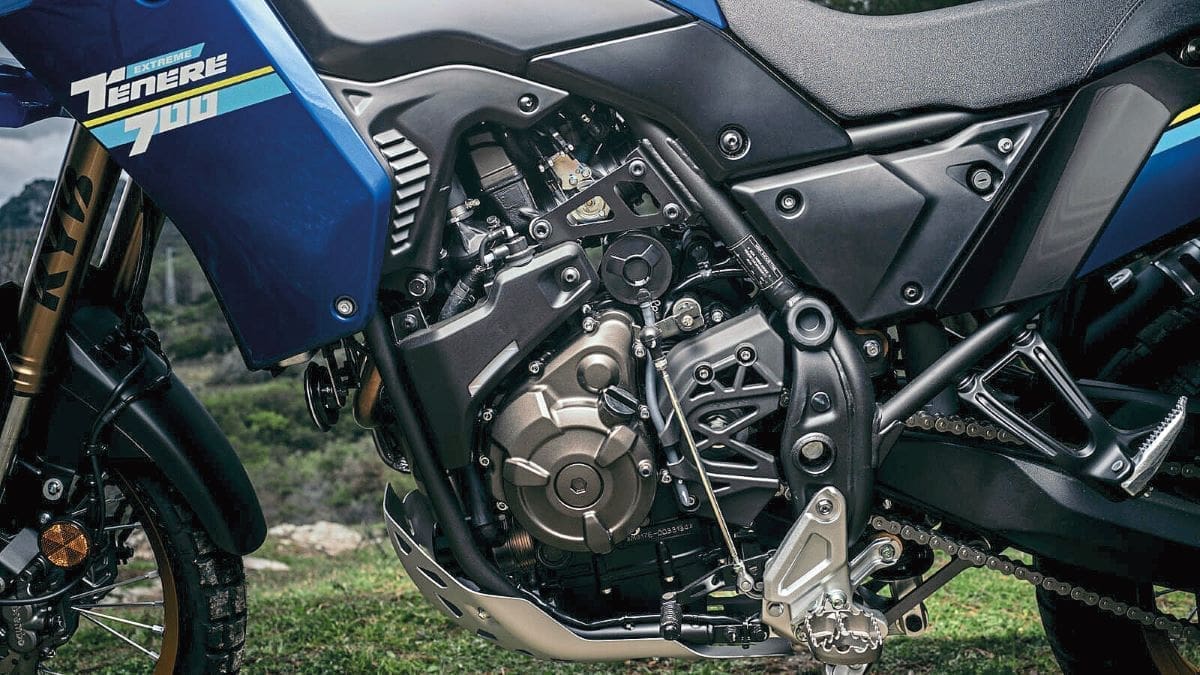
When I first clapped eyes on the Extreme, I knew I was in for a treat. It has an iconic off-road image, sharpened with new LED headlights and indicators, hand guards fixed to the tapered bars, a new front mudguard echoing design from its sister WR and YZ motocross range, all matched perfectly to its blue and yellow striped livery. I was excited to get a taste for this beast, but I’d be lying if I said the sheer size wasn’t ever so slightly daunting given that we were about to take it up the side of a rather steep mountain.
Jacked up with a seat height of 910mm and a brimmed 16-litre fuel tank sitting high above the saddle, the last thing I needed was scrape this 205kg monster off the floor if, god forbid, I slipped on a sheep shit, which appeared to be a standard obstacle on our Welsh mountain course at the YORE centre. Once I’d managed to swing my leg over the bike and compose myself after very nearly losing my balance (maybe I should have gone for the lower seat, after all?), I was away and feeling much more comfortable when the wheels were in motion. That’s the thing with these big bikes – once you’re up and running, you soon forget about how wrong they feel when you first lift the sidestand and take the weight between your thighs.
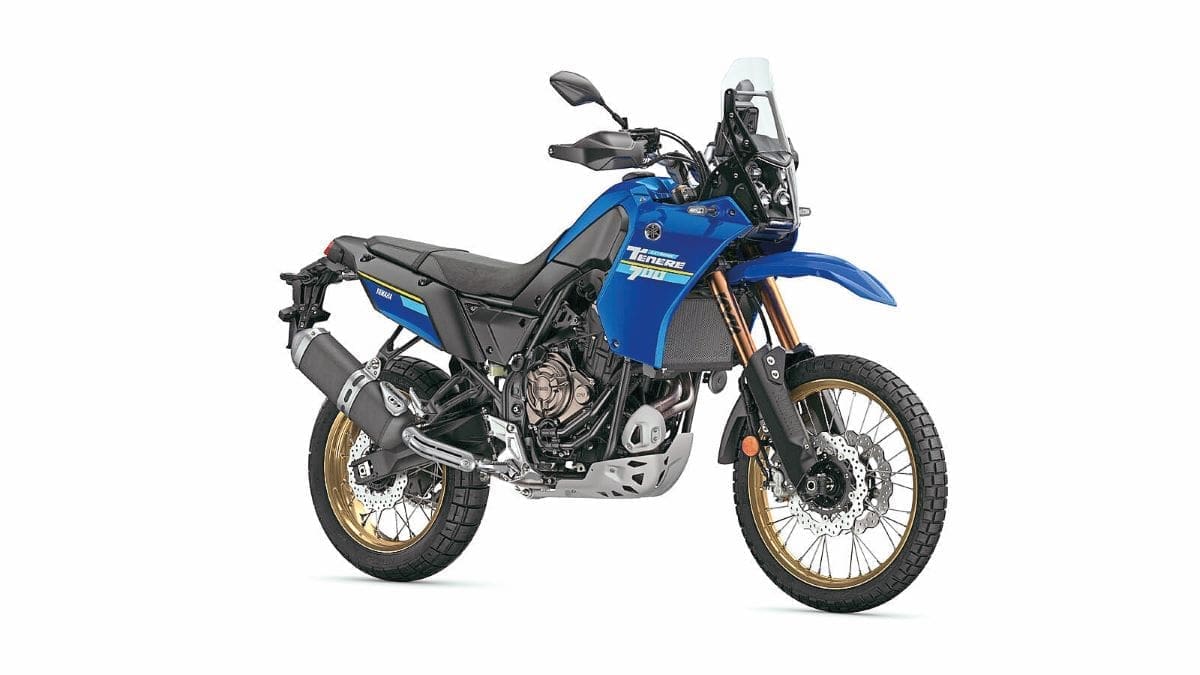
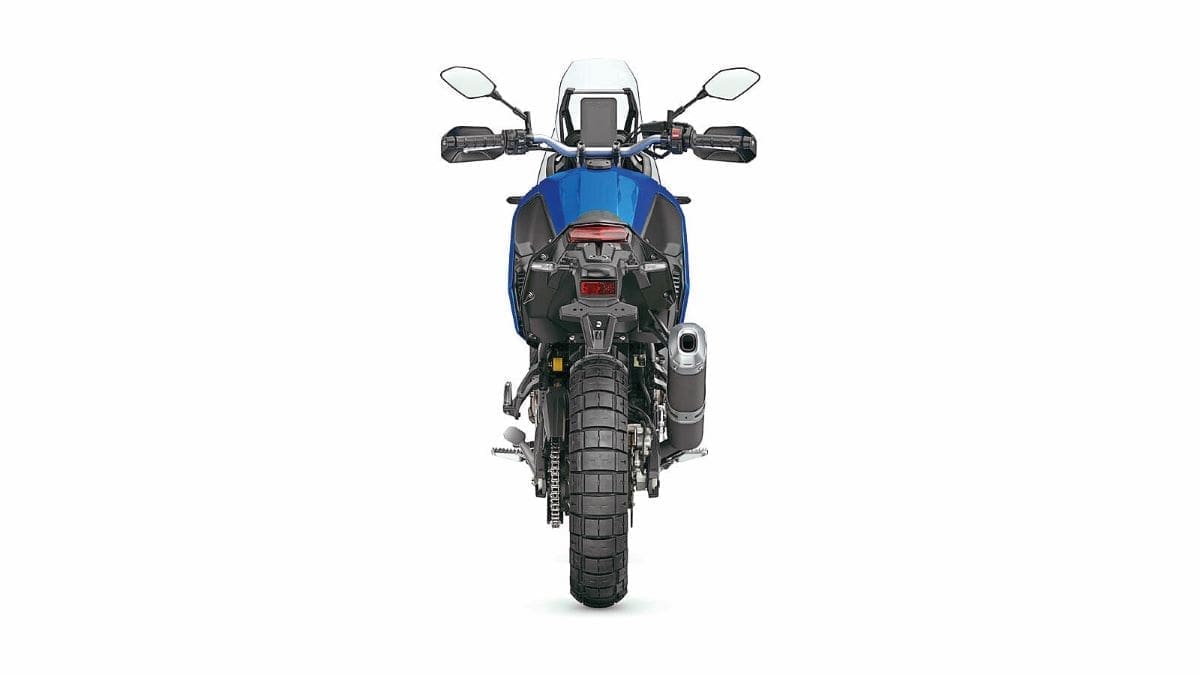
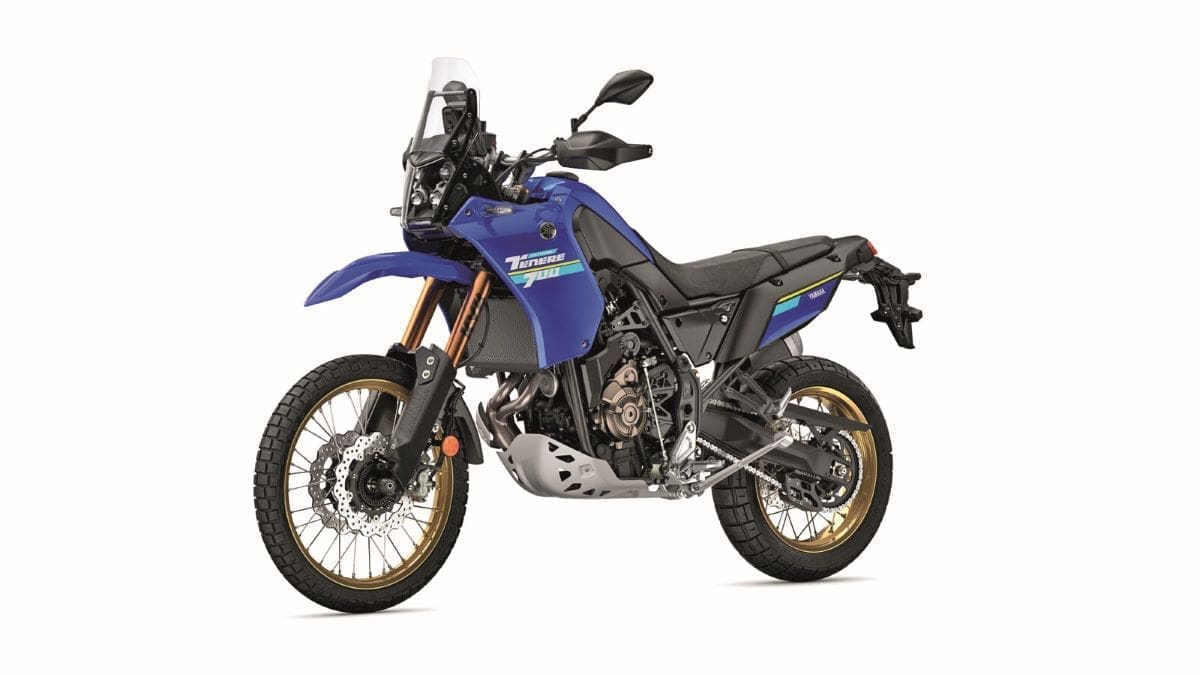
We meandered our way through the Jones’s livestock farm and up into the mountainous Welsh countryside. Thankfully, the first part of the route was across fairly easy-going flinty shale farm tracks, albeit with a decent elevation gain and laden with potholes – the perfect warm-up to get a feel for the T7 Extreme, in my book.
What struck me instantly was how smooth the ride was thanks to the upgraded KYB suspension, which felt incredibly plush and seemed to take everything in its stride. It appeared that the weight of the bike actually helped, and everything was slow, soft and unreactive, and it went against everything I thought this bike would be. Yes, there was a fair bit of pitch as I hit the brakes or accelerated hard, but I always find when you’re riding at a relaxed pace, this soft motion really adds to the comfort and riding experience and gives the rider much more feedback and feel as to what’s going on underneath.
The same must be said for the power delivery: silky-smooth from the first touch of the throttle and linear right through the rev range, yet potent and strong enough to haul the weight of the big girl through the slop while finding the traction to get up the hills without feeling like it’s about to run out of steam. Getting this girl on the back wheel wasn’t such a big deal either, much to my surprise, and after a few attempts and a quick slip of the clutch, it was up with ease and effortless to hold with the predictable throttle.
As with all Tenere models, the Extreme uses the trusty old CP2 689cc twin-cylinder motor also found in the MT07, the R7 and the Tracer models; 73bhp at 9000rpm and 68Nm of torque at 6500rpm is more than you’ll ever need off-road, yet this motor is easy and controllable, even on the most unforgiving terrains, which is why it made perfect sense for Yamaha to continue using it in the updated Tenere range. It has a distinctive soundtrack – a typical throaty twin but playful at the same time, and not so loud that you’d piss off the locals or the sheep.
We were advised by the instructors at the YORE centre to turn off the ABS (the only electronic intervention the rider has access to on the Tenere) using the simple switchgear set-up, which anyone could navigate their way to through, it really is so basic, unlike many bikes I’ve tried. There are actually three ABS options: all on, rear off, and all off, but when it comes to off-road riding, ABS is the very last thing you need, so off it went. The only catch with the T7 is if you kill the ignition, the system defaults to ABS on, which is slightly annoying if you’re only riding off-road, but a worthy safety feature for mixed on and off-road riding. Through short and frequent stops, I got into the habit of either stalling the bike or dropping the sidestand, which kept the ABS settings live. As for the rest of the electronics, the only other key feature to mention is the five-inch TFT, portrait-oriented, Dakar-style dash, which is awesome. The rider has a choice of three themes: street, explorer and rally raid. Obviously, it doesn’t change the characteristic of the bike and it’s literally just for aesthetic purposes, but a cool feature, nonetheless.
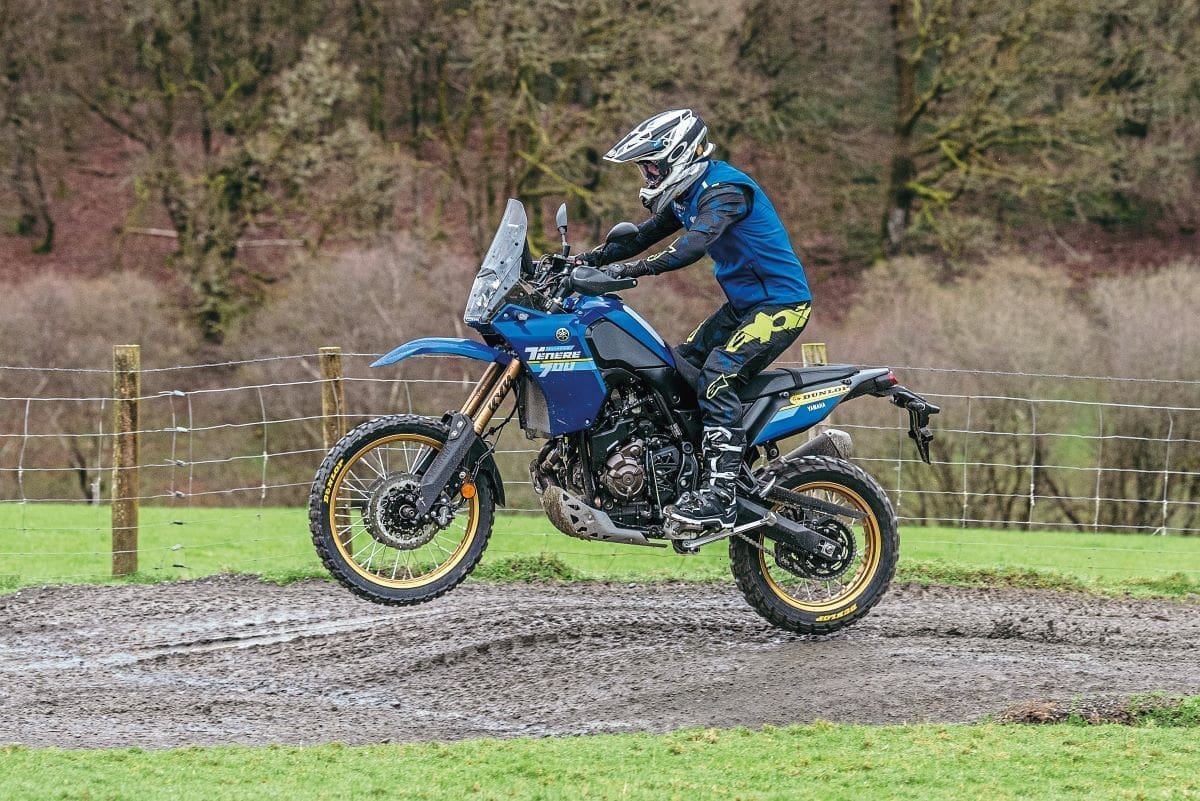
As the day progressed, so did the level of adversity on the tight and twisty forest tracks, riding through ruts brimmed with water so deep it went over the tops of our boots, but nevertheless, the Tenere trundled on and never skipped a beat, as you’d expect from any worthy adventure machine. I wouldn’t go as far as saying its nimble, mainly thanks to the fact that I spend a lot of time on motocross bikes which are literally half the weight, but after some time in the saddle of the Tenere, you really start to understand the feeling and know how far you can push it and start to build a rhythm for the getting through the corners with relative ease, and there wasn’t anything that I couldn’t tackle due to it being a Tenere, so I guess that explains its manoeuvrability a bit better.
For one of our photo-stop loops, we had a fairly high-speed section through the trees and over some jumps, with hefty braking bumps and a few hairpins thrown in for good measure. It was the perfect test of agility and performance, and with every lap, my confidence grew tenfold. This bike is so confidence-inspiring, and I went from being uptight and slightly nervous to really relaxed and trusting within a short space of time. I’d say this to anybody thinking of getting an adventure bike – take time to understand and you will be so surprised with the capabilities of these bikes… how apt this bike was for challenging off-road riding blew my mind.
As the pace picked up, so did the need for more support in the suspension, so we added four clicks of rebound to the rear to slow things down, and it made a huge difference. I did find the bottom of the stoke a couple of times while sending it over the jumps though, but I’m going to put that down to me getting a little too carried away. Like I say, you soon forget how heavy the bike is once you get used to it. The brakes were awesome too, with loads of feel in the lever and strong braking power through the twin 282mm disc and Brembo caliper combo. With the ABS off, you could soon get in a pickle, and I was very nearly humbled a few times on the fast downhill sections while squeezing the brake. It was a swift reminder that I was riding a Tenere and not a WR.
The YORE crew have fitted Dunlop Trailmax Raid tyres to the full fleet of Teneres, which is a much more off-road adventure-focused tyre, better suited to the conditions, as opposed to the standard fitted Pirelli Scorpion Rally STR tyre, which is more of a halfway house between road and off-road adventure riding. Given the sodden conditions and some of the tracks we had to ride through, this was an extremely good call. As for the rest of the bike, well, it’s pretty much the same across all Tenere models. I’m not going to bore you with those generic details, so here’s a brief summary instead. Underneath its naughty off-road Extreme glamour, it’s still just a Tenere 700… I say ‘just’ – the proof is in the pudding and there is a reason why Yamaha hasn’t tried to reinvent its adventure expert… it works!
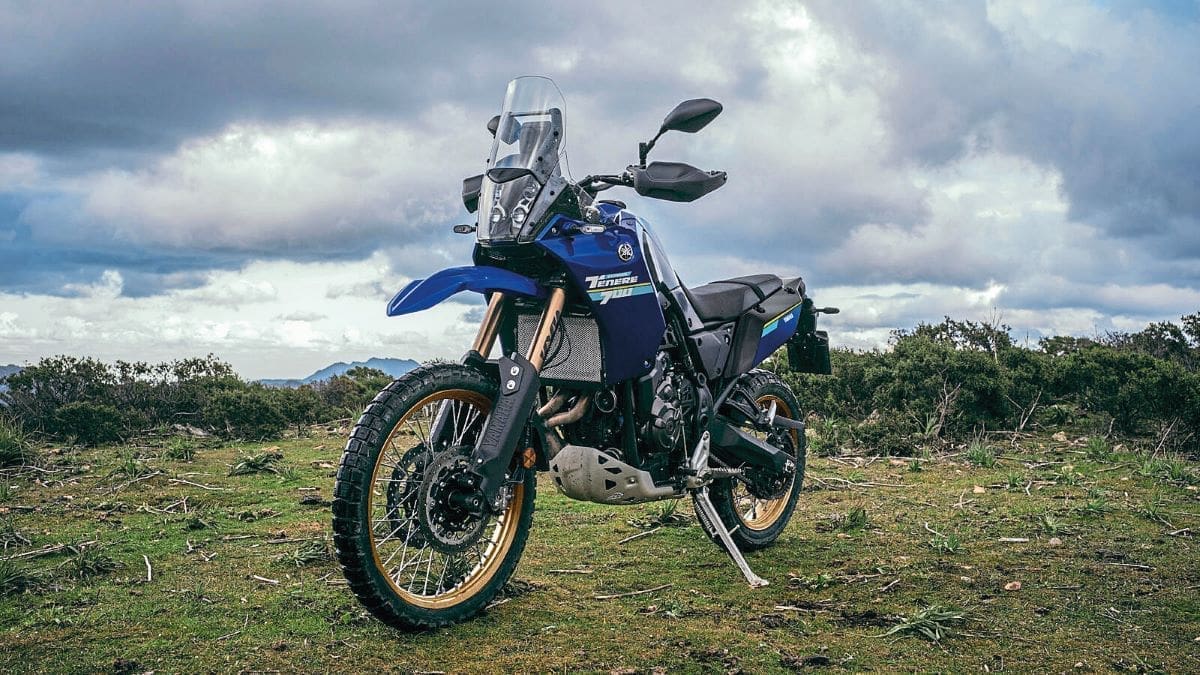
A lightweight double cradle tubular steel frame, aluminium swingarm and 21-inch front and 18-inch rear spoke wheels hold this bike together, trying to keep the weight to a minimum while providing enough rigidity for you and me to sling it around without feeling like it’s going to snap in two. Fold-back gear and rear brake pedals are a worthy component for off-road riding, and the ‘slim’ 16-litre fuel tank (which didn’t feel particularly slim to me) means it is plenty big enough for your endeavours, especially with an average range of 4.16 litres per 62 miles. Oh, and you get a USB outlet for your sat-nav or phone charger.
If pimping your ride floats your boat, then fear not: Yamaha offers a strong selection of bolt-on goodies to trick up your Tenere. There’s the lower seat and link, an Akrapovic slip-on end can, a heavy-duty engine skid plate, aluminium top chain guard, tank grip pads, handlebar risers, a sidestand extender and a headlight protector.
I haven’t ridden the other Tenere models so can’t make direct comparisons, but having spent time talking to those who have, it is clear that the Extreme doesn’t suffer the limitations of the standard model, which means that Yamaha has hit the nail on the head with this machine. I can only talk from my experience with the Tenere 700 Extreme, but I’ve done a lot of off-road riding over the years to know what’s good, and what I love about this bike are the pure, no-nonsense features. It is so rider-friendly, under-complicated and extremely capable, with all the right accolades you’d ever want from an adventure machine. It’s brilliant off-road and has a super-smooth power delivery but packs a punch big enough for you to have some serious fun with. It has great suspension which will deal with whatever you throw at it and, to top things off, its sexy on the eye.
Priced very reasonably, there’s no wonder the Teneres have been so popular over the last five years, and speaking as a tight farmer myself, if you want value for money, then you’re looking at a serious contender right here.
I finally understand why the adventure sector most definitely has the limelight at the moment, so I’d like to say a big thanks to the team at the Yamaha Off-road experience centre for providing us with a fantastic day out in the Welsh countryside, riding some awesome bikes.
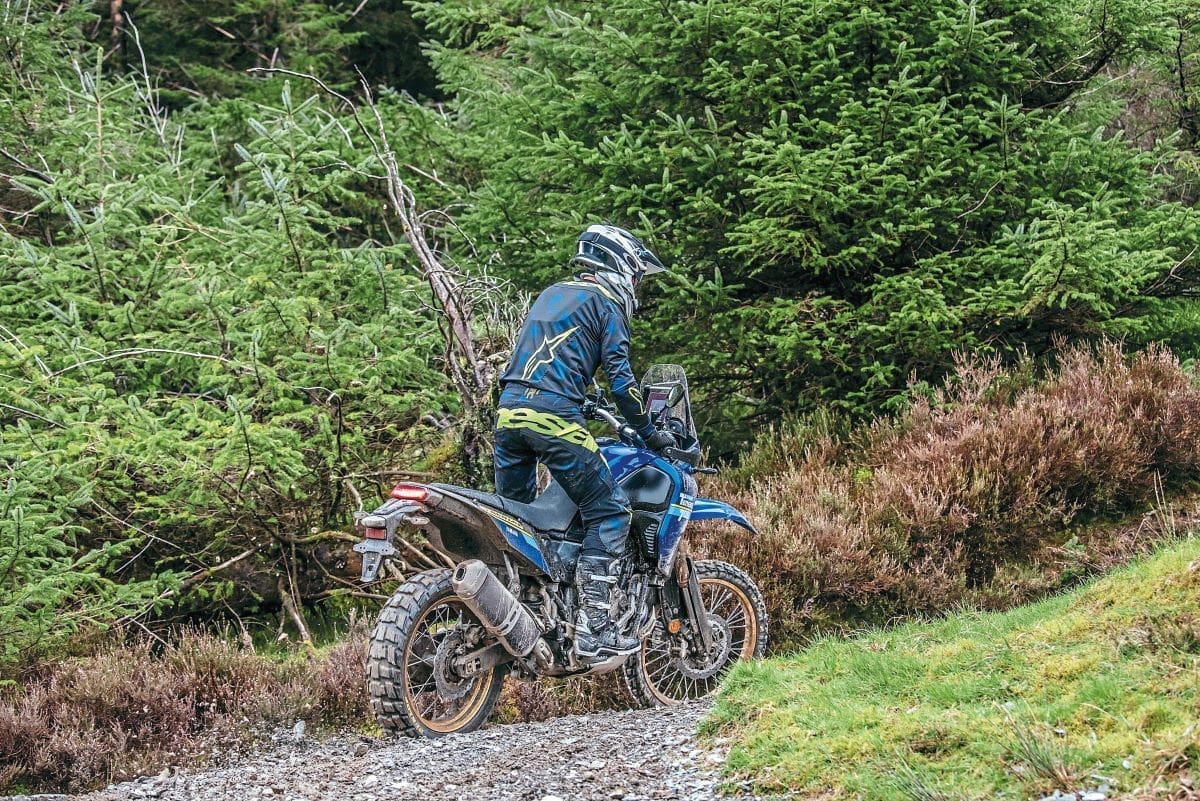
Tech Data
Yamaha Tenere 700 Extreme
ENGINE
Type: 689cc, four-stroke, two-cylinder, liquid-cooled, dohc
Bore x stroke: 80.0 × 68.6mm
Compression: 11.5:1
Fuelling: EFI
Claimed power: 73bhp @ 9000rpm
Claimed torque: 68nm @ 6500rpm
ELECTRONICS
Riding modes: No
Traction control: No
ABS: Yes
Quickshifter: No
Blipper: No
Wheelie control: No
Launch control: No
CHASSIS
Frame: Double cradle, tubular steel frame
F suspension: 43mm KYB, fully adjustable, 230mm travel
R suspension: Fully adjustable, link type, 220mm travel
Front brakes: Dual disc, 282mm
Rear brakes: Single disc, 245mm
DIMENSIONS
Wheelbase: 1595mm
Seat height: 910mm
Wet weight: 205kg
Fuel capacity: 16 litres
INFO
Price: £10,906
From: www.yamaha-motor.eu


